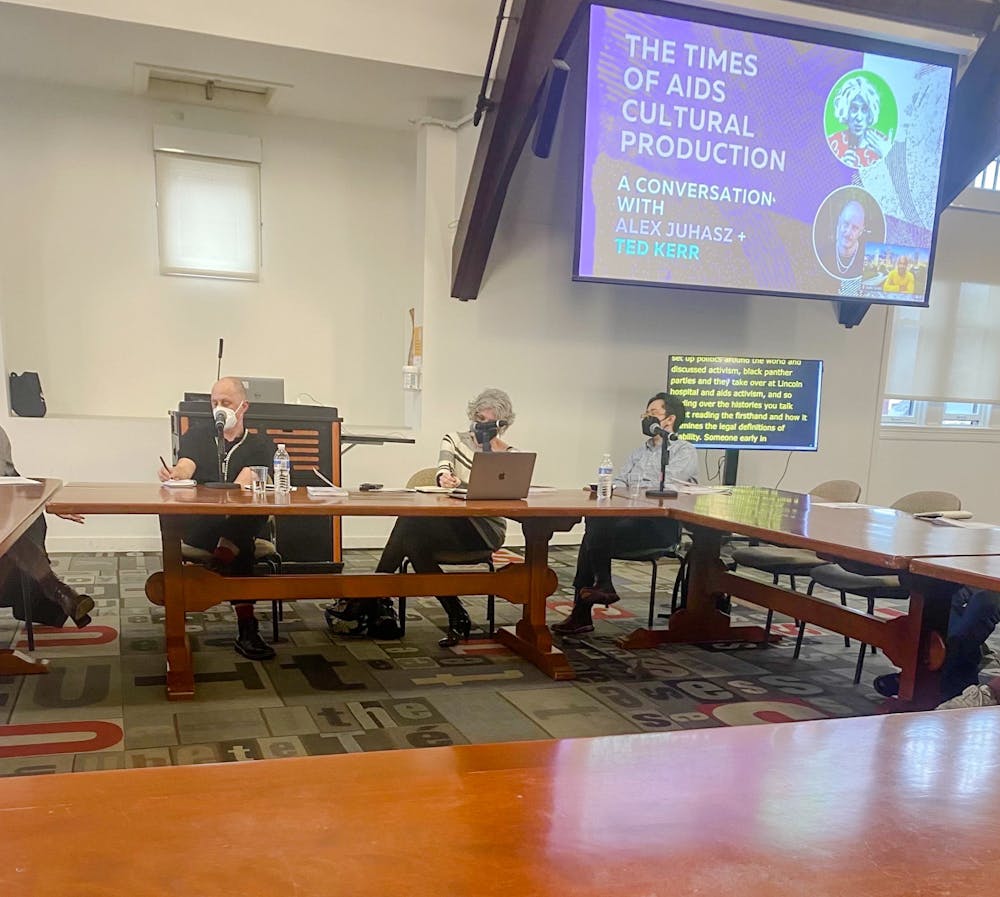Alexandra Juhasz, professor of film at Brooklyn College, and Theodore Kerr, lecturer of interdisciplinary arts at The New School, discussed their new book “We Are Having This Conversation Now: The Times of AIDS Cultural Production,” at an event hosted by the Cogut Institute for the Humanities Tuesday.
The book, published November 2022, lays out a timeline of the American AIDS epidemic and its relationship to national culture. The talk, titled “The Times of AIDS Cultural Production,” featured a structured question-and-answer session with Sofia Sacerdote ’22.5 and Justin Smith ’02, director of the Campaign to End AIDS at Positive Impact Health Centers.
According to Kerr, the book’s 13 chapters tell different stories about AIDS and its impact on either individuals or American culture as a whole. Each chapter discussed cultural factors that either silenced or highlighted people with AIDS.
The book’s narration resembles a conversation between the two authors: “We wanted to create something of record that put our thinking into a book,” Kerr said. Juhasz hopes that this writing style will inspire a broader conversation between the book and its readers.
Attendee Charlotte Marcil ’23 noticed this interest in conversation at Tuesday’s event. “It seemed like (the authors) were interested in hearing from everyone that came to the event,” Marcil said. “All the audience members were treated as participants (in) the conversation.”
The panelists discussed AIDS “Crisis Culture,” a period of nationwide panic from 1987 to 1996 characterized by “mass cultural production … about HIV/AIDS leading to social, political and medical breakthroughs,” according to the book.
Juhasz, who was involved in AIDS discourse during the Crisis Culture, said that conversations about the condition were unavoidable. “If you were a young political person living in a city, you were thinking about (AIDS) because it was so impactful.”
The authors then discussed the “First Silence” and “Second Silence.” The former refers to a period between 1981 and 1987 when the U.S. government largely ignored AIDS and its impact on communities of color while simultaneously perpetuating homophobic ideologies. The latter refers to a period between 1996 and 2008 following the Crisis Culture when AIDS fell into mainstream cultural irrelevance.
According to Kerr, the term “silence” in the names of both periods refers to ignorance from the public, not a literal lack of noise. This silence inspired Kerr’s research into the disease: “I wanted to create noise,” he said.
Reflecting on their work, Juhasz discussed the importance of avoiding another period of silence surrounding AIDS.
AIDS “isn't something that just happened in the 1980s (to) gay men,” Juhasz said. “And it isn't just something that we can anticipate soon that it will be over. The presence of HIV, the now-ness of HIV, is a fundamental message.”
“One of the many lessons of HIV is that people working together can change the world for the better,” Kerr said. “Hopefully, our book does that for the individual (and) community.”
Dennis Carey is a Sports editor who enjoys playing volleyball, listening to and collecting vinyl records and poorly playing the guitar in his spare time.





